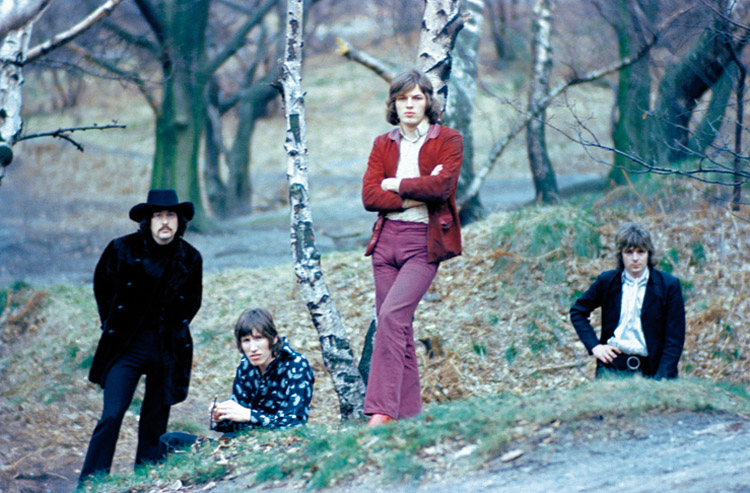
Roger "Syd" Barrett, Radovan "Bob" Klose, Nick Mason, Roger Waters and Richard Wright probably gave each other the name The Pink Floyd Sound in January 1965 at a dance on the grounds of the Royal Air Force in Uxbridge (West London). And that in the middle of the performance, because the quintet, originally announced as The Tea Set, was sharpening its grip on the fact that another band, which also played that evening, was trading under the same name. Even if there are other rumours about the origin of the name Pink Floyd, it probably goes back to a suggestion of Syd Barrett, who combined the first names of the old Carolina blues musicians Pink Anderson and Floyd Council. "When we later became part of the London Underground, this name was a lucky coincidence because the combination of 'Pink' and 'Floyd' has a psychedelic ambiguity," commented Mason in 2004.
But the origins of Pink Floyd go back further. Waters, Barrett, David Gilmour and later Floyd cover designer Storm Thorgerson grew up in Cambridge. Thorgerson described Barrett with the words: "He was the first of us to go for the Beatles. Many of us became writers, musicians, artists, theatre people. Syd was Syd." There were several pre-Pink Floyd bands where Barrett, Gilmour, Mason, Waters and Wright repelled each other's horns. Barrett's school friend Albert Prior remembers: "I was already in a band when Syd approached me in the school toilet. He wanted to know what he had to do to get into a band and especially what haircut was necessary."
But Pink Floyd's nucleus lies in London's Regent Street Polytechnic, where Mason, Waters and Wright met during their architectural studies. Together with Barrett, who had also moved to the English capital to study art, and other musicians, they formed a band whose name had changed frequently until that evening in Uxbridge in January 1965.
Rapid ascent
From 1966 Pink Floyd went meteorically up and forward. Under the artistic leadership of Syd Barrett, the young group became an integral part of London's underground scene. She left the rhythm'n'blues of her early days behind her and got lost in Barrett's psychedelic visions, which perfectly depicted the zeitgeist - and vice versa. LSD was more than just a hallucinogenic drug, it was a lifestyle. The Summer of Love, Swinging London: an inspiring breeding ground. Science fiction stories, an atmosphere of new beginnings through new techniques and new social structures, pastoral memories of Victorian England and pictures and visual languages of bizarre fairy tales. Pink Floyd and London should be shaped by all of this next year.
In 1967, it happened one after the other: almost two hundred concerts were to be given. Pink Floyd were part of the Peter-Whitehead film "Tonite Let's All Make Love In London", which mirrored the feverish scene in the capital. The singles "Arnold Layne" and "See Emily Play" become the anthem of the lively city. On February 28th EMI signed the band and the following day the recordings for the debut LP "The Piper At The Gates Of Dawn" started at Abbey Road Studios. "Piper" should become one of the most important psychedelic albums. And yet it doesn't reflect the rampant freak-outs the band sparked live.
It has often been reported that the immense pressure that the first commercial successes brought with them and his immense LSD consumption were increasingly psychologically damaging Syd Barrett. So much so that he fell seriously ill and it was no longer possible to work with the band. On 20 January 1968 Pink Floyd played their last concert with Barrett in Hastings - already with David Gilmour as second guitarist. For the next gig on January 26th in Southampton the band just didn't pick him up anymore. Without Barrett's knowledge Pink Floyd played more gigs. For Richard Wright, who shared an apartment with Barrett in Richmond at the time, the situation was difficult: "I had to say things like 'Syd, I'm going to get cigarettes', then I went to the concert and didn't come back until the next day. It was terrible."


